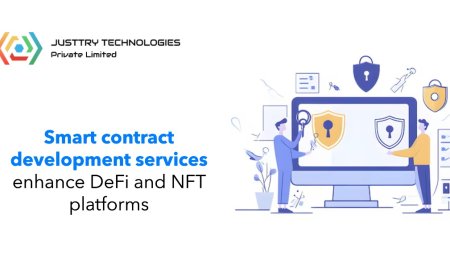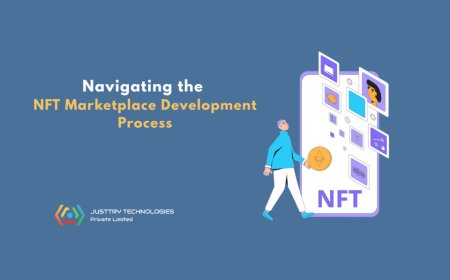How DevSecOps Secures Cloud Infrastructure Efficiently?
Discover how DevSecOps secures cloud infrastructure efficiently with automated security checks, continuous monitoring, and proactive threat prevention.

Introduction
Cloud computing has become the go-to solution for modern businesses. It offers unmatched scalability, flexibility, and efficiency. But with this shift to the cloud comes a growing concern — security. Traditional security models often fail to keep up with the pace of cloud innovation. That’s where DevSecOps comes in. By integrating security directly into the development and operations pipeline, DevSecOps ensures that cloud infrastructure is secure, stable, and scalable from the ground up.
In this blog, we’ll explore how DevSecOps helps secure cloud infrastructure more efficiently. You’ll learn what DevSecOps really means, how it works in cloud environments, and why businesses are adopting it to stay ahead in today’s fast-moving digital world.
What is DevSecOps?
A Quick Overview
DevSecOps is a method that blends development (Dev), security (Sec), and operations (Ops) into one smooth, continuous process. It encourages teams to build, test, and release software with security built into every phase. Unlike older practices where security checks happen at the end, DevSecOps pushes security to the very start of the development cycle.
Why DevSecOps Matters
In the cloud, infrastructure is constantly changing. Resources spin up and down, containers are deployed rapidly, and teams push updates frequently. If security isn’t embedded throughout the process, it’s easy for misconfigurations or vulnerabilities to go unnoticed. DevSecOps makes sure that never happens.
The Challenges of Securing Cloud Infrastructure
Constantly Changing Environments
Cloud infrastructure isn’t static. It changes often, sometimes several times a day. Manual security checks can’t keep up with this speed, leaving gaps in protection.
Complex Configurations
Cloud services come with many settings, and a small misstep — like leaving a storage bucket public — can lead to a major data breach. It's easy to overlook security when speed is the priority.
Shared Responsibility
In the cloud, the responsibility for security is shared between the provider and the customer. While cloud providers secure the base infrastructure, users must secure their own configurations, data, and access controls. This requires a proactive and ongoing approach.
How DevSecOps Secures Cloud Infrastructure
1. Security from the Start
DevSecOps brings security into the earliest stages of cloud infrastructure planning. Developers write code that defines infrastructure (known as Infrastructure as Code, or IaC), and this code is scanned for security issues before it's deployed. This ensures resources like servers, databases, and networks are set up securely from day one.
2. Automated Security Checks
Automation is a key part of DevSecOps. Security tools are integrated into the CI/CD (Continuous Integration and Continuous Deployment) pipeline. These tools automatically scan code, check cloud configurations, and identify any known vulnerabilities. As a result, security checks happen instantly, not days or weeks later.
3. Real-Time Monitoring and Alerts
DevSecOps tools continuously monitor the cloud environment. They track activities like user access, network traffic, and system changes. If something unusual happens — like someone trying to access sensitive data — alerts are sent immediately. This real-time monitoring helps prevent breaches before they escalate.
4. Policy Enforcement and Compliance
DevSecOps helps enforce security policies across all cloud resources. For example, if company policy requires all data to be encrypted, the system will automatically check whether encryption is enabled and flag any violations. This also helps with compliance for regulations like GDPR or HIPAA.
5. Collaboration Between Teams
Security isn’t just the job of one team anymore. DevSecOps encourages collaboration between developers, operations staff, and security experts. Everyone shares responsibility, communicates regularly, and works toward the common goal of secure infrastructure.
Tools Used in DevSecOps for Cloud Security
Infrastructure as Code Scanners
Tools like Terraform, AWS CloudFormation, and Pulumi let developers define infrastructure using code. DevSecOps tools like Checkov or TFLint scan this code to catch misconfigurations before they go live.
Container Security
Containers are widely used in the cloud. DevSecOps tools like Aqua Security or Sysdig scan container images for vulnerabilities and monitor them during runtime.
Secret Management
Sensitive information like API keys and passwords must be stored securely. Tools like HashiCorp Vault or AWS Secrets Manager handle this by encrypting secrets and controlling access.
Continuous Monitoring
Platforms like Datadog, AWS CloudTrail, or Splunk monitor cloud environments in real-time. They log activities, detect anomalies, and help teams respond quickly to threats.
Compliance Tools
DevSecOps solutions like Prisma Cloud and Lacework provide automated compliance checks and generate reports for audits. This ensures that infrastructure always follows best practices and legal requirements.
Read more: How DevSecOps Revolutionizes Cloud Security Today?
Benefits of Using DevSecOps in Cloud Infrastructure
Faster Detection and Resolution
Because security is built into every step, problems are caught early. Developers can fix issues before they reach production, saving time and reducing risk.
Lower Costs
Fixing security issues after deployment is expensive. DevSecOps helps catch and fix problems early, reducing the cost of security incidents.
Higher Uptime
DevSecOps minimizes downtime by preventing security breaches and ensuring systems are stable. This is especially important for businesses that rely on 24/7 availability.
Improved Compliance
With automated checks and documentation, meeting industry standards becomes easier. Teams spend less time preparing for audits and more time building features.
Stronger Security Culture
DevSecOps fosters a culture where security is everyone's responsibility. This leads to better decisions, more secure code, and fewer surprises down the road.
Real-World Scenarios of DevSecOps in Action
A retail company using AWS faced issues with misconfigured S3 buckets exposing customer data. After adopting DevSecOps, they integrated IaC scanning tools and real-time monitoring. Within weeks, they eliminated configuration errors and secured all their cloud resources.
A healthcare startup needed to meet HIPAA compliance quickly. Using DevSecOps tools, they automated encryption checks, implemented access controls, and monitored logs for unauthorized access. They not only became compliant but also created a secure foundation for growth.
Getting Started with DevSecOps for Your Cloud Infrastructure
Start Small
You don’t need to overhaul everything at once. Begin by integrating basic security checks into your development pipeline. Gradually expand to cover more areas like IaC scanning, secrets management, and monitoring.
Choose the Right Tools
Pick tools that match your cloud platform and fit into your existing workflows. Look for open-source options if you’re just starting out.
Train Your Team
Make sure developers, IT staff, and managers understand how DevSecOps works. Offer training on secure coding, cloud configurations, and best practices.
Automate Wherever Possible
The more you automate, the fewer chances there are for human error. Automate code scans, compliance checks, and alert systems to maintain a strong security posture.
Review and Improve
Security is not a one-time task. Regularly review your DevSecOps strategy, check for gaps, and update your tools and practices to match new threats.
Conclusion
Securing cloud infrastructure is no longer something businesses can afford to take lightly. As threats grow more complex and cloud systems become more essential, security needs to evolve. DevSecOps is that evolution. By combining development, security, and operations into one unified process, it helps organizations build safer, faster, and more reliable cloud infrastructure.
DevSecOps makes security a natural part of everyday work instead of an extra chore. It saves time, reduces costs, and ensures that cloud systems remain secure even in the face of rapid change. Businesses that adopt DevSecOps can stay competitive and gain a clear edge in today’s digital world.
Just as a clone app development company creates precise and scalable solutions tailored to your business needs, DevSecOps ensures that your cloud infrastructure is built with precision, efficiency, and top-tier security from the start.
FAQs
What is the main role of DevSecOps in cloud infrastructure?
DevSecOps integrates security into every stage of the cloud infrastructure lifecycle, ensuring that security checks are automated, continuous, and part of the development process.
How does DevSecOps prevent misconfigurations in the cloud?
DevSecOps uses tools to scan infrastructure code before deployment. These tools check for common misconfigurations and ensure that all cloud resources meet predefined security policies.
Can DevSecOps help with regulatory compliance?
Yes, DevSecOps tools automate compliance checks and generate detailed reports, helping businesses meet regulations like GDPR, HIPAA, and ISO standards.
Is DevSecOps suitable for small teams or startups?
Absolutely. Small teams can start with lightweight tools and gradually build their DevSecOps capabilities. Even basic automation can significantly improve cloud security.
How does DevSecOps support real-time threat detection?
It includes continuous monitoring tools that track cloud activities, detect unusual behavior, and send alerts instantly. This helps teams respond to threats in real time.



































